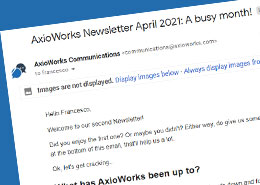Welcome to our second Newsletter!
Did you enjoy the first one? Or maybe you didn’t? Either way, do give us some feedback using the links at the bottom of this email, that’ll help us a lot.
Ok, let’s get cracking…
What has AxioWorks been up to?
March has been a month of solid work at AxioWorks, all heads down and furious typing on our keyboards. The planning is done, now we’re building.
We are working on the next update of SQList, SQList Version 7! Because of the several new features and improvements that are going in it, we have decided to release it as a major version update: good bye version 6, welcome version 7!
We’re aiming for May 1st 2021 as the release date. But you know how these things go, it could be a little earlier or a little later than that…
At the same time we have also been reorganising and rebranding our website. Our current one is not as tidy nor is performing as well as we’d like, so we’ve decided to move stuff around and give it a fresh coat of paint.
So, a new major version of SQList and good rebranding across the board. We won’t tell you anything more, just watch this space!
Focus blog entry: MS Lists has finally landed in MS Teams
During this Pandemic era, working remotely has significantly increased throughout the world and so is the usage of tools to facilitate collaboration and communication. One such tool is Microsoft Teams which now has 115 million daily active users. MS Teams has become a preferred tool of communication for companies using Microsoft stack which is why it makes perfect sense to improve its usage for collaboration. SharePoint Lists has been widely used for maintaining and storing data in SharePoint and with the recent launch of Microsoft Lists the usage has grown significantly as well.
Read all about it in this month’s article: MS Lists has finally landed in MS Teams.
SQList feature of the month: Export the details of the Author and Editor of a list item
When you export a SharePoint list for a SQL table, SQList exports a number of “system” columns. These are columns that do not contain business data but rather information about the list item. Two of these columns are the Author and the Editor of the item (respectively, the user who created and the user who last edited the item). In these two columns you will find the ID (an integer number) of those users; this number is the key of the user in the “User Information Table”, a hidden list is SharePoint that contains the details of all users in the site collection.
Now, if you want to know who those Authors and Editors are, you need to export the User Information List to your SQL database and join to it in your SQL queries, just like you would do with any other lookup column. If you want to know more detail about this, check out our support article: How can I export the list of SharePoint users?
Featured articles
Here is a small selection of interesting articles from the net.
SharePoint Server Object Model Tutorial
A very good overview of the SharePoint server object model, SharePoint server side object model examples, and a comparison of SharePoint server side object model vs client side object model.
Read more…
How to create an approval workflow for SharePoint pages using Power Automate
If you are part of a larger organization and have multiple contributors to the content of SharePoint pages, you might want to create some sort of approval process such that changes to the page can be reviewed prior to publishing. In this article, I explain to you how to create an approval workflow for SharePoint pages using Power Automate without a single line of code.
Read more…
Does metadata still make sense in SharePoint Online?
This is a great question, indeed and not without merit. If you have been following SharePoint Online since its inception in 2011 (when it became part of Office 365), I am sure you have noticed a slow shift from metadata back to good old folders. While I do not have any official data to back this up, I personally have seen a decline in metadata usage and user adoption among my clients. There are a few reasons due to which I can attribute such a trend.
Read more…
Let us know what you think about this newsletter
(it only takes a click…)
That’s all folks, till next time.
